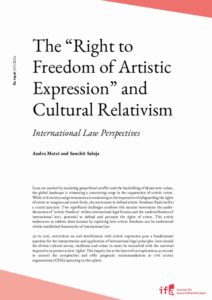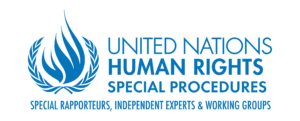 The German Institute for Foreign Relations (ifa) has published a paper that examines two major challenges to the defence of artistic freedoms: the insufficient discussion of “artistic freedom” in international legal fora and the insufficient use of the potential of international law to defend and promote artists’ rights. At its core, the input asks how the diverse cultural norms, traditions, and values in states should be reconciled with the universal imperative to protect artists’ rights?
The German Institute for Foreign Relations (ifa) has published a paper that examines two major challenges to the defence of artistic freedoms: the insufficient discussion of “artistic freedom” in international legal fora and the insufficient use of the potential of international law to defend and promote artists’ rights. At its core, the input asks how the diverse cultural norms, traditions, and values in states should be reconciled with the universal imperative to protect artists’ rights?
Andra Matei and Sanchit Saluja: The “Right to Freedom of Artistic Expression” and Cultural Relativism. International Law Perspectives (PDF, eng)


